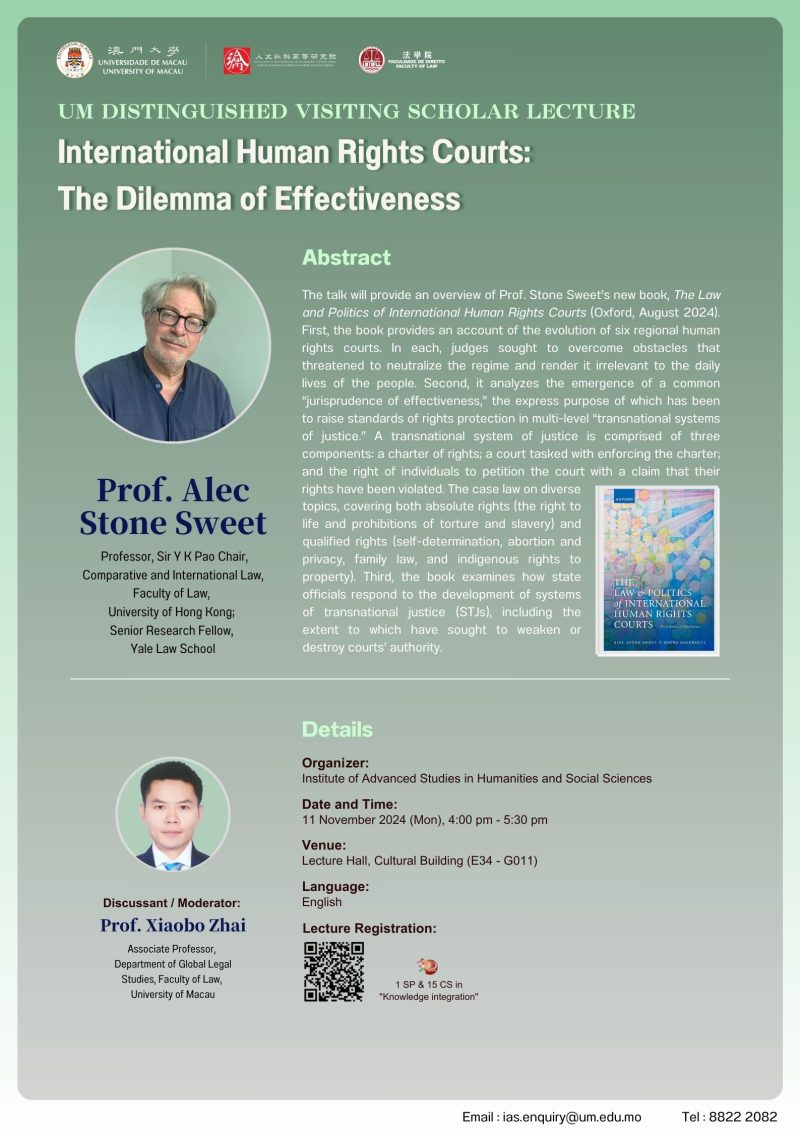【IAS】UM Distinguished Visiting Scholar Lecture – “International Human Rights Courts: The Dilemma of Effectiveness” by Professor Alec Stone Sweet (11 November 2024; 4-5:30 PM)
【高研院】澳大傑出訪問學者講座系列 - 國際人權法庭:效力困境 - Alec Stone Sweet教授 (2024年11月11日;下午4-5:30)

The Institute of Advanced Studies in Humanities and Social Sciences (IAS) cordially invites you to participate in the UM Distinguished Visiting Scholar Lecture, scheduled for 11 November 2024 (Mon). We are honoured to have Professor Alec Stone Sweet from the University of Hong Kong, explore the topic of “International Human Rights Courts: The Dilemma of Effectiveness.” We are also delighted to have Professor Xiaobo Zhai from the Department of Global Legal Studies of FLL, as the discussant / moderator for this lecture. Please find the details below:
- Title: International Human Rights Courts: The Dilemma of Effectiveness
- Organizer: Institute of Advanced Studies in Humanities and Social Sciences
- Date: 11 November, 2024 (Mon)
- Time: 4-5:30 PM
- Language: English
- Venue: Lecture Hall, Cultural Building (E34 – G011)
- Registration: https://go.um.edu.mo/wgceg4uv
Abstract:
The talk will provide an overview of Prof. Stone Sweet’s new book, The Law and Politics of International Human Rights Courts (Oxford, August 2024). First, the book provides an account of the evolution of six regional human rights courts. In each, judges sought to overcome obstacles that threatened to neutralize the regime and render it irrelevant to the daily lives of the people. Second, it analyzes the emergence of a common “jurisprudence of effectiveness,” the express purpose of which has been to raise standards of rights protection in multi-level “transnational systems of justice.” A transnational system of justice is comprised of three components: a charter of rights; a court tasked with enforcing the charter; and the right of individuals to petition the court with a claim that their rights have been violated. The book analyzes the case law on diverse topics, covering both absolute rights (the right to life and prohibitions of torture and slavery) and qualified rights (self-determination, abortion and privacy, family law, and indigenous rights to property). Third, the book examines how state officials respond to the development of systems of transnational justice (STJs), including the extent to which have sought to weaken or destroy courts’ authority.
We look forward to seeing you at this event! For more information about IAS, please visit the website of IAS at https://ias.um.edu.mo/. Should you have any questions, please do not hesitate to contact us at ias.programme@um.edu.mo.
Best regards,
The Institute of Advanced Studies in Humanities and Social Sciences
![]() Students who attend on-site will receive 1 SP and 15 CS for “Knowledge Integration” in the Whole Person Development Award.
Students who attend on-site will receive 1 SP and 15 CS for “Knowledge Integration” in the Whole Person Development Award.![]()

